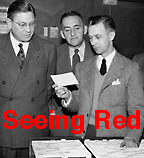

Within academe, the University's reputation suffered. According to Charles Gates' history of the UW, after Canwell "a number of departments on the campus had occasion to discover during the ensuing years the doubtful esteem in which the University of Washington was held at other institutions."
The UW's experience with the Canwell Committee also had implications far beyond the Seattle campus. Schrecker believes the Washington case set a precedent that allowed other schools to declare Communists unfit to teach. "The University of Washington case had cleared the way," she writes. "Once the anti-Communist consensus and the machinery for enforcing it was in place, it was to become all too easy for academic institutions to turn against other types of political undesirables."
And in the decade following the UW case, that is exactly what happened. Professors found their memberships in organizations and their stands on social issues scrutinized. Often, merely being subpoenaed by an investigative committee was enough to cost someone a job. Promotions were held up; passports permitting participation in international scholarship were denied. Many states, like Washington, instituted loyalty oaths.
The tide turned eventually. But for most who had lost their jobs and their reputations, it was too late. Because of its role in what happened, it was perhaps appropriate that the UW finally issued a public apology--even though only one of the professors charged in 1948 was still alive to hear. The time was January, 1994, the occasion a ceremony honoring Harry Bridges, a labor leader who had been accused of communism during the same period. Then-President William Gerberding had this to say:
"My task is to state clearly and unequivocally that the University of Washington was wrong to dismiss Ralph Gundlach and the other two and to have brought into disrepute, or to have participated in bringing into disrepute the other three who were involved. . . . This was a dark day in our history, and we must make sure that it doesn't happen again. `Make sure' may be too strong a phrase; there's nothing anybody can `make sure' in history. We must do what we can to ensure that it doesn't happen again.
"I don't wish to be judgmental or pious about this. I don't know what I would have done had I been there . ... Presidents are under some considerable pressure. But whatever the ex post facto justifications or explanations may be, the basic, simple truth is that what happened to those professors ... was an outrage. It was a disgrace. It was, in the dictionary sense, not in the perverted sense, un-American."
Nancy Wick, '97, is a writer in the UW Office of News and Information and assistant editor of the UW faculty/staff newspaper, University Week. She earned her Ph.D. in speech communication in August.
Red Alert: Lectures, Exhibits and a Play about the Canwell
Hearing
Return to the Beginning of "Seeing
Red"
Reader Reaction to "Seeing Red": Was It "Superb" Reporting or "Trash"?
Online Primary Sources of the Canwell Committee Hearings
Send a letter to the editor at columns@u.washington.edu.